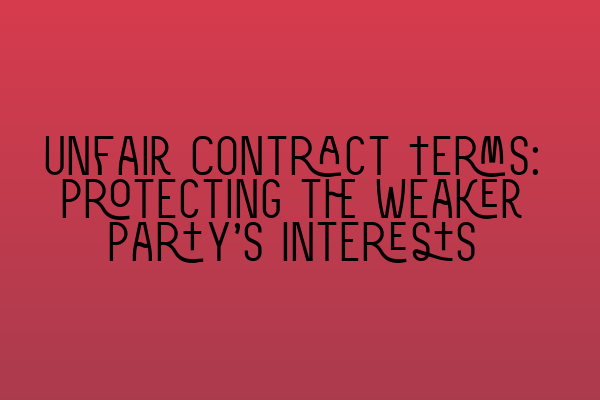Unfair Contract Terms: Protecting the Weaker Party’s Interests
Contracts are an essential part of our daily lives, governing various interactions and transactions. Whether we are entering into agreements for goods or services, contracts set the terms and conditions that bind the parties involved. However, there are instances where a party with more bargaining power may take advantage of their position and impose unfair terms on the weaker party. This is where the concept of unfair contract terms comes into play, aiming to protect the interests of the less powerful party.
Unfair contract terms encompass provisions that create an imbalance between the rights and obligations of the parties. These terms typically favor the stronger party, often leaving the weaker party at a significant disadvantage. Examples of unfair contract terms could include excessively high penalties for breach, unfair limitations of liability, or terms that unfairly restrict the weaker party’s rights.
Legal frameworks have been established to protect against unfair contract terms and ensure a fair and equitable playing field. In the United Kingdom, the Consumer Rights Act 2015 and the Unfair Contract Terms Act 1977 provide safeguards for consumers and business buyers, respectively.
The Consumer Rights Act 2015
The Consumer Rights Act 2015 offers protection to consumers who enter into contracts for goods, services, or digital content. It prohibits unfair terms in consumer contracts and provides consumers with legal remedies in case of unfairness.
Under the Act, a term is considered unfair if it significantly disadvantages the consumer, contrary to the requirement of good faith. Factors such as the transparency of the term, the nature of the goods or services, and the bargaining power of the parties are taken into account when assessing fairness.
The Act also introduces a “fairness test” for assessing consumer contracts. This test considers whether a term could cause a significant imbalance in the parties’ rights and obligations to the detriment of the consumer. If a term is deemed unfair, it is unenforceable against the consumer.
It is crucial for businesses to be aware of the Consumer Rights Act 2015 and ensure their contracts comply with its provisions. By doing so, they can avoid potential disputes, legal challenges, and reputational damage.
The Unfair Contract Terms Act 1977
The Unfair Contract Terms Act 1977, on the other hand, protects business buyers from unfair contract terms. The Act applies to contracts for the sale or supply of goods, hire-purchase agreements, and contracts for the hire of goods.
Similar to the Consumer Rights Act 2015, the Unfair Contract Terms Act 1977 defines certain contract terms as unfair and unenforceable. These terms include exemption clauses and unfair limitations of liability that seek to exclude or restrict liability for breach of contract or negligence.
The Act presumes that such terms are unfair unless they satisfy the requirement of reasonableness. To be considered reasonable, the term must meet a fairness test that takes into account the circumstances known to or reasonably foreseeable by the parties at the time of contract formation.
It is essential for businesses engaging in commercial transactions to understand the implications of the Unfair Contract Terms Act 1977. By ensuring their contracts comply with the Act, businesses can mitigate the risk of being held accountable for unfair terms and protect their reputation in the market.
Conclusion
Unfair contract terms can leave the weaker party vulnerable and at a significant disadvantage. To protect the interests of consumers and business buyers, the United Kingdom has enacted legislation such as the Consumer Rights Act 2015 and the Unfair Contract Terms Act 1977.
By understanding and complying with these laws, businesses can create fair and equitable contracts that provide protection to all parties involved. It is crucial for businesses to review their contracts regularly, seeking legal advice if necessary, to ensure they do not inadvertently include unfair terms.
If you are preparing for the SQE (Solicitors Qualifying Examination) and want to enhance your legal knowledge, check out our related articles:
